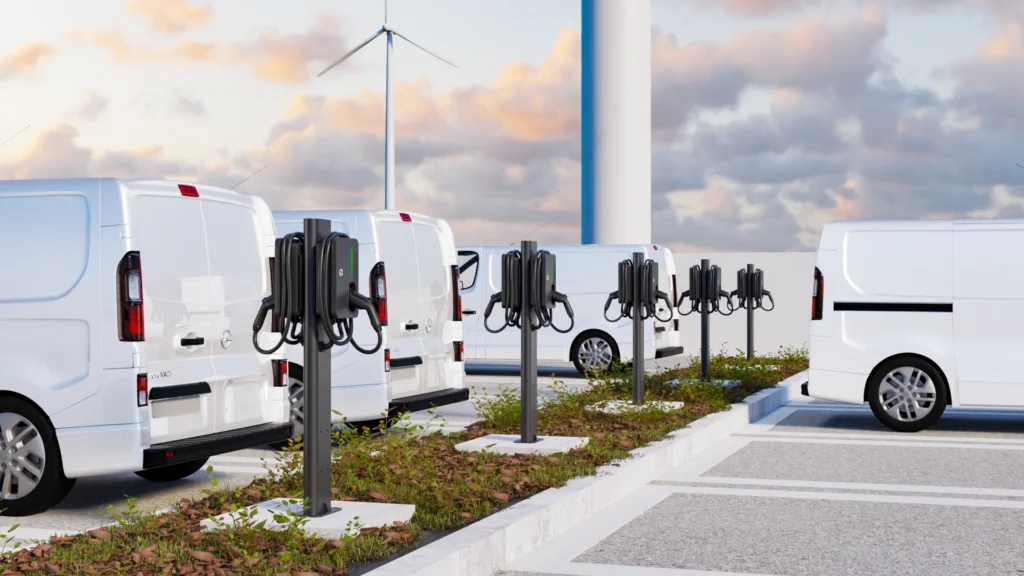
Vehicle-to-Grid (V2G): The Future of EV Charging and a Smarter Energy Grid
Vehicle-to-Grid technology is redefining the role of electric vehicles, turning them into dynamic energy assets that benefit drivers, utilities, and the planet.

As electric vehicles (EVs) continue to dominate the automotive industry, fleet operators face new challenges in managing their electric vehicle fleets efficiently. The transition to electric fleets offers numerous environmental and cost benefits, but it also requires a robust, reliable, and scalable charging infrastructure. The key to a successful EV fleet operation lies in selecting the right EV chargers, capable of supporting the specific needs of a growing fleet while ensuring operational efficiency, cost-effectiveness, and long-term sustainability.
In this article, we’ll explore the core requirements of fleet operators looking for electric vehicle chargers and highlight the factors they should consider when choosing a supplier. We’ll also delve into how the right charging infrastructure can help fleet operators optimize their operations, reduce costs, and scale their fleets efficiently.
With the global shift toward electrification, many companies are converting their vehicle fleets to electric in order to meet sustainability goals and reduce long-term operational costs. However, the transition to electric fleets comes with its own set of challenges. The most critical of these challenges is ensuring the availability of a charging infrastructure that can handle the scale and complexity of fleet operations.
Fleet operators need charging solutions that go beyond basic functionality. As fleet sizes grow, so do the demands for charging speed, reliability, and smart management features. A well-optimized charging system not only meets the immediate charging needs of a fleet but also provides the flexibility and scalability to grow alongside the business.
The efficiency of an EV fleet depends heavily on the speed at which vehicles can be charged. Charging speed plays a crucial role in minimizing downtime for vehicles, particularly in fleets with high utilization rates. For fleet operators, the ability to charge vehicles quickly between trips can significantly enhance productivity.
To meet the needs of fleet operations, fast-charging solutions like DC fast chargers (up to 60 kW and above) can ensure that vehicles are ready for the next journey as quickly as possible. On the other hand, Level 2 chargers are often a cost-effective option for fleets with less demanding charging schedules.
When selecting chargers, fleet operators should ensure that the chargers’ power output is sufficient for their fleet size. With the right charging infrastructure, fleet operators can minimize charging time and maximize vehicle availability.
A fleet charging solution should be more than just a network of chargers; it must include a smart charging management system that helps fleet operators monitor and optimize charging across the entire fleet. Features like remote monitoring, scheduling, and load balancing can significantly improve the efficiency of fleet operations.
Remote monitoring: Enables fleet operators to track the performance and health of each charger in real-time, allowing them to identify and resolve issues before they impact operations.
Load balancing: Distributes the available power among multiple chargers based on the fleet’s needs and the local power grid’s capacity, preventing grid overloads and ensuring optimal charging efficiency.
Scheduling: Enables fleet operators to schedule charging sessions during off-peak hours, reducing energy costs by taking advantage of lower electricity rates.
By choosing a charging solution that offers these smart features, fleet operators can save time, reduce costs, and ensure their fleet is always ready to go.
As fleet operations expand, the charging infrastructure must be able to grow alongside it. Fleet operators should prioritize scalable charging solutions that can be easily upgraded to accommodate additional vehicles without significant capital investment.
A scalable charging network allows fleet operators to:
When evaluating charging solutions, fleet operators should look for suppliers that offer modular and future-proof systems that can evolve with technological advancements and changes in fleet size.
Cost control is a major priority for fleet operators, and charging infrastructure is no exception. When choosing EV chargers, fleet operators should consider both the upfront costs and the long-term operational costs associated with the system.
The right charging infrastructure should help optimize energy consumption and reduce operating costs. Advanced charging systems with energy management capabilities can help fleet operators manage their energy usage effectively. These systems can provide insights into energy consumption patterns, suggest opportunities to reduce costs, and help operators manage energy demand, ensuring that chargers are not consuming more power than necessary.
By investing in energy-efficient solutions, fleet operators can enjoy lower energy costs and better control over their fleet’s operational expenses.
Reliability is non-negotiable when it comes to fleet charging infrastructure. Fleet operators need a supplier that provides durable, high-quality chargers designed to withstand the demands of continuous use. These chargers must also be easy to maintain, with minimal downtime for repairs or service.
Fleet operators should choose a supplier that offers comprehensive warranty programs and has a reputation for providing strong after-sales support. This ensures that the fleet is never left without charging infrastructure for an extended period, keeping operations running smoothly.
When selecting EV chargers, fleet operators should prioritize suppliers who offer chargers that meet industry standards and certifications. This includes certifications like ISO, CE, and UL, which guarantee that the chargers are safe, reliable, and compliant with local regulations.
Fleet operators should also ensure that chargers are compatible with global charging standards such as OCPP (Open Charge Point Protocol) and ISO 15118, which ensure interoperability and future-proofing of the charging network.

(Joint EVH007 EV Fleet Charging Solutions)
When looking for a supplier, fleet operators should choose one that not only offers high-quality charging equipment but also provides the full spectrum of services necessary to support the fleet’s operations. This includes the installation, monitoring, maintenance, and upgrading of charging infrastructure as needed.
A good supplier will be able to provide:
As electric vehicle fleets become an increasingly important part of transportation across various industries, the demand for robust and reliable charging infrastructure continues to rise. By choosing the right EV fleet chargers, fleet operators can optimize charging operations, reduce costs, and support the sustainable growth of their fleets.
With the right charging solutions, fleet operators can ensure that their vehicles are always ready for the road, providing the efficiency, flexibility, and cost savings needed to maintain a competitive edge in the evolving electric vehicle landscape. Whether you’re looking for smart charging management, fast charging, or scalable solutions, a trusted EV charger supplier can provide the infrastructure your fleet needs to succeed.

Vehicle-to-Grid technology is redefining the role of electric vehicles, turning them into dynamic energy assets that benefit drivers, utilities, and the planet.

At this ACT Expo, Joint Tech will unveil its latest advanced commercial Level 2 charging solution, designed to enhance the user experience. Meanwhile,powered by new technology, our commercial chargers effectively address multiple challenges encountered in real-world applications.

The new tariffs imposed by the United States have once again caused global economic tension.In order to respond to the impact on the global supply chain, Joint new factory in Malaysia offers favorable tax rates.